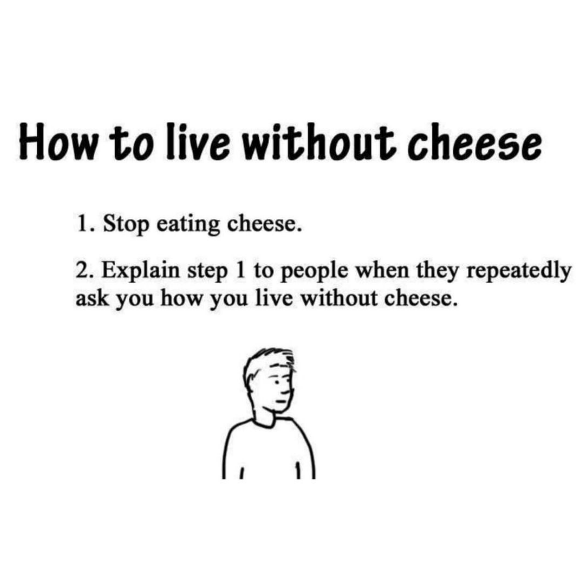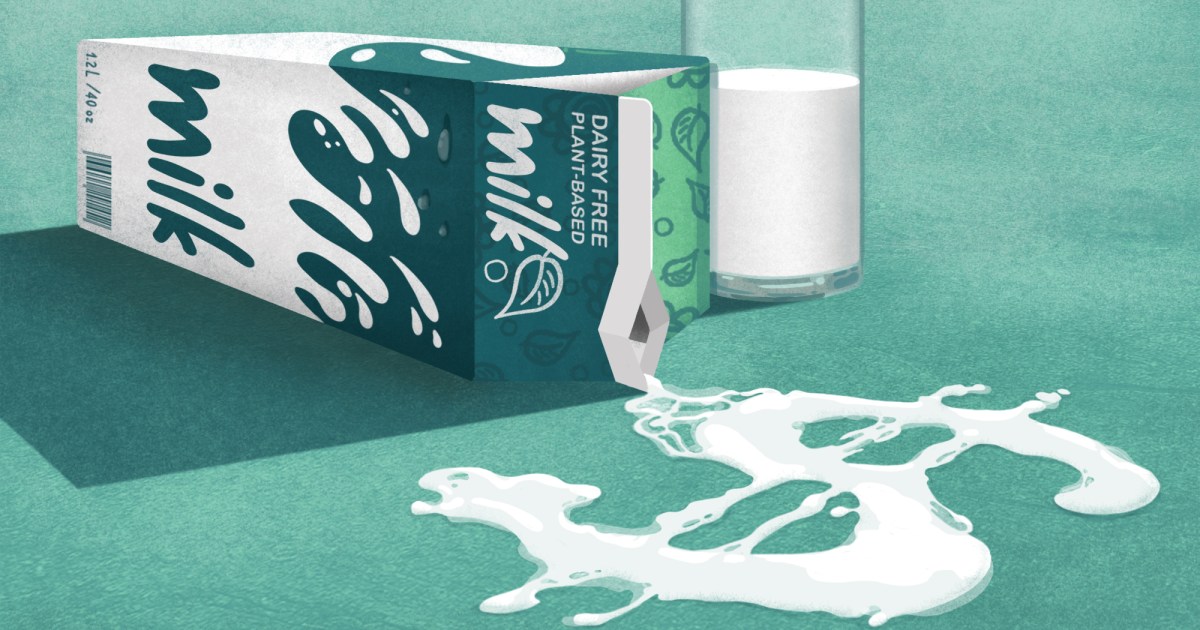Like an estimated two-thirds of the world’s population, I don’t digest lactose well, which makes the occasional latte an especially pricey proposition. So it was a pleasant surprise when, shortly after moving to San Francisco, I ordered a drink at Blue Bottle Coffee and didn’t have to ask—or pay extra—for a milk alternative. Since 2022, the once Oakland-based, now Nestlé-owned cafe chain has defaulted to oat milk, both to cut carbon emissions and because lots of its affluent-tending customers were already choosing it as their go-to.
Plant-based milks, a multibillion-dollar global market, aren’t just good for the lactose intolerant: They’re also better for the climate. Dairy cows belch a lot of methane, a greenhouse gas 25 times more potent than carbon dioxide; they contribute at least 7 percent of US methane output, the equivalent emissions of 10 million cars. Cattle need a lot of room to graze, too: Plant-based milks use about a tenth as much land to produce the same quantity of milk. And it takes almost a thousand gallons of water to manufacture a gallon of dairy milk—four times the water cost of alt-milk from oats or soy.
But if climate concerns push us toward the alt-milk aisle, dairy still has price on its side. Even though plant-based milks are generally much less resource-intensive, they’re often more expensive. Walk into any Starbucks, and you’ll likely pay around 70 cents extra for nondairy options.
. Dairy’s affordability edge, explains María Mascaraque, an analyst at market research firm Euromonitor International, relies on the industry’s ability to produce “at larger volumes, which drives down the cost per carton.” American demand for milk alternatives, though expected to grow by 10 percent a year through 2030, can’t beat those economies of scale. (Globally, alt-milks aren’t new on the scene—coconut milk is even mentioned in the Sanskrit epic Mahābhārata, which is thousands of years old.)
What else contributes to cow milk’s dominance? Dairy farmers are “political favorites,” says Daniel Sumner, a University of California, Davis, agricultural economist. In addition to support like the “Dairy Checkoff,” a joint government-industry program to promote milk products (including the “Got Milk?” campaign), they’ve long raked in direct subsidies currently worth around $1 billion a year.
Big Milk fights hard to maintain those benefits, spending more than $7 million a year on lobbying. That might help explain why the US Department of Agriculture has talked around the climate virtues of meat and dairy alternatives, refusing to factor sustainability into its dietary guidelines—and why it has featured content, such as a 2013 article by then–Agriculture Secretary Tom Vilsack, trumpeting the dairy industry as “leading the way in sustainable innovation.”
But the USDA doesn’t directly support plant-based milk. It does subsidize some alt-milk ingredients—soybean producers, like dairy, net close to $1 billion a year on average, but that crop largely goes to feeding meat- and dairy-producing livestock and extracting oil. A 2021 report by industry analysts Mintec Limited and Frost Procurement Adventurer also notes that, while the inputs for dairy (such as cattle feed) for dairy are a little more expensive than typical plant-milk ingredients, plant alternatives face higher manufacturing costs. Alt-milk makers, Sumner says, may also have thinner profit margins: Their “strategy for growth is advertisement and promotion and publicity,” which isn’t cheap.
Starbucks, though, does benefit from economies of scale. In Europe, the company is slowly dropping premiums for alt-milks, a move it attributes to wanting to lower corporate emissions. “Market-level conditions allow us to move more quickly” than other companies, a spokesperson for the coffee giant told me, but didn’t say if or when the price drop would happen elsewhere.
In the United States, meanwhile, it’s a waiting game to see whether the government or corporations drive down alt-milk costs. Currently, Sumner says, plant-based milk producers operate under an assumption that “price isn’t the main thing” for their buyers—as long as enough privileged consumers will pay up, alt-milk can fill a premium niche. But it’s going to take a bigger market than that to make real progress in curbing emissions from food.
Need to keep the ag subsidies flowing so that rural areas keep voting conservative
It’s not as if Democrats don’t also throw plenty of bones to farmers.
Even if the farmers themselves are likely to be relatively conservative, they’re such a politically sympathetic group that no one wants to be seen as “going after hard-working real American farmers!”. Things like the Iowa caucuses playing a huge role in national politics don’t help either (although the Dems have thankfully killed that).
One thing nobody has commented on - how that article slips in a seemingly positive mention of Nestlé (they own the cafe that uses plant milks). That raised my eyebrows.
I’m beginning to notice a handful of company ties to “make perfect the enemy of good” takes like this.
It’s enough to drive one to schizophrenia. Everything is a hidden message
C̵̡̢̡̢̙̰̻̘̠͎̟͖̯̉͐̉̊̓̎̽͂͆̈̄̔͊͊̃̔̈́́̂̑̿̐̈́͑͛̆̾̈́́͘̚̕͝͝ơ̴̢̧̨̢̟̳̜͙̝͚̟̞͖̞̲͙͍̠͎̞̫͙̮̦̥̯̹̟̦̘̮̖͛͋̏̂̈́̽̓͊͂̃̀̒́͒̏͛̓̐̅́̽͛̇͆̀̽̋͋̋̈́̍́̓͑̚̕͝ͅn̸̡̧̨̛̛̛͍̺̤͎̮͕̟͇̞̙̞̯̤̭̠̥̰̹͍̮͍͙̫̮͉̫̻͖̜̭̦̱͚͎͖͖͓̹̽͛̊̂̓̿̄̏̊̀̀͌̓̽̏͂̒̂̌̄̄̀̊̆̏͑̈́̊̊͌͒͗̀̎̈́̚̕͝͝͠s̴̡͔̗͖̝͖̫̩̲̗̪̤̯̳̼̲̼̈́́̅̇̿̀̎͗́͗͒̀̿̌̎͐͛̆͗͆̿̓̈͗͌̌͒͒́̚̕̚̚͝ṵ̸̢̥̭͎͍̲̟͍̹͙̱̦̤̮̜̖͕̪̱̼̞̜̖̹̥̜͍̝̑̄̆̍̉͒̍̌̅̏̌̊̇͑̄̂̇͌́̿̈́̾͂̏̒͛̐̐̉̏̕̕̚̚͜͜͝͠͝͝ͅͅͅm̵̡̡̨̻̱̹̙̭͚͔̣̘͎̬̖̝̲͈̦̱͓̤̤̲̲̫̫̩͔̮̻̂͋̄̀͐̀̔̿̊̾̋͐̃͆̕̕͜ͅe̸̢̡͇̤͔͈̮̥͓̙͓̻͙̹̦͔̼͔͛̉́̇ͅͅ
Always follow the money. Nobody does journalism for free.
Except almonds. Almonds are terrible water wasters, and mostly grown in California where they can least afford the water.
Still more efficient on resource utilization than animal agriculture. If you hate almond milk for that reason, you should want the dairy industry completely abolished.
Shit, you should want all animal agriculture banned.
Based and correct.
Eh, there are plenty of use cases where certain land types aren’t really arable. Ruminants fill that niche easily.
The catch is that like 80% of the land used for livestock currently could also use crops instead.
Fwiw US dairy plans to be carbon neutral by 2050.
The bigger catch is that 70% of all crops we grow go to our livestock.
We wouldn’t need to use those lands if we just ate less meat.
deleted by creator
The bigger catch is that 70% of all crops we grow go to our livestock.
this isn’t true
Livestock accounts for 77% of global farming land, while supplying only 18% of calories and 37% of protein.
So you’re saying almond milk drinkers could end up going to hell someday?
/s -The Good Place reference
I feel like trying to compare a water intensive crop grown in a place known for drought to crops that can be grown in many places where water is far more readily available is being a bit disingenuous. You’re not comparing apples to apples.
I mean, you could say that we shouldn’t be wasting resources on animal agriculture anywhere, but especially in the same places that don’t have enough water for crops.
Feeding food and giving water to other “food” will always be far less efficient than just providing a fraction of that water to plant-based foods. Animal agriculture is a waste.
I don’t want it gone but I don’t want it subsidized. I’m not planning on being vegan but I’m cutting out a ton of animal protein from my life. I make it a special thing.
Almond is the worst of the nut milks, but it’s STILL way better for the environment than dairy.
What you get in stores is not even really almond milk. Real almond milk would be way too expensive to be competitive.
Exactly… Ughh I still fail to understand why almond milk is popular among vegans. It’s very expensive and doesn’t even taste that nice…
True. Soy and oat milk can be very good, depending on the brand.
Even soy milk in the US isn’t really just soy milk. There are so much stuff added to it. It’s thick too.
I grew up drinking a lot of real soy milk which has a watery consistency that I can get at some Vietnamese / Chinese grocery stores or tofu shops. Flavor is quite different too.
Though I guess the US put thickeners and other stuff into theirs to help imitate milk
Reccomendation on brands?
My favorite oat milk is Oatly Barista, the best soy milk I’ve tried is from Joya, but I haven’t seen it outside of Austria yet. Alpro is quite good and more widely available (at least in Europe). In North America, Silk seems to be great from what I’ve heard. Store brand soy milks tend to taste pretty bad from my experience here in Germany, but some of them might have improved since I tried them years ago.
Oatly and Califia both have great oat milks. They also have barista milks that substitute for half and half in coffee!
Thank you for the suggestions!
My personal theory is that we subsidize dairy not for the milk, but for the cheese. As far as I’m aware you can’t make cheese out of plant milks, and we’ve gotten pretty reliant on cheese as a source of protein and other nutrients in our American diets - especially among children and lower income diets.
You can make plant-based cheeses. And some of them are pretty good. But they lack all of the same properties. Like, you can get a cheese that that when hot will stretch a little bit like the cheese on a pizza, but as it cools off it loses all of that elasticity and is not great for lukewarm pizza. You can get cheese that is pretty decent for lukewarm and hot pizza, but it doesn’t have that stretch. It more just rips apart. And you definitely don’t have the span of “flavors” of cheese or whatever you’d call it. Some of the big ones, sure, but again, they don’t have all the same physical properties.
I don’t mind the loss of those properties, but many people do.
Cheese isn’t a great source for protein compared to beans in regards to price though.
Honestly, I think we subsidize the dairy industry simply because they’ve been lobbying so long. Meat is subsidized too. It’s the one market that the conservatives are fine with ignoring the mantra of “free market” and support regulating the hell out of it in whatever way supports the “farmers” (big farm is nothing like the labeling suggests and is all headed by big guys in suits who likely never have been on a farm in their life).
Beans can taste amazing when prepared by a competent chef, but often taste like shit when prepared wrong.
Cheese, on the other hand, is much more forgiving of poor preparation. Eat it straight out of the package, sliced and on bread or crackers, melt it into sauces, or grill it, or any number of other uses.
Simply put, cheese is fast and easy, and can elevate almost any other food.
Also, try to get kids to eat beans. It can happen. But not easily, and often you have to do it in the form of chili, with loads of cheese.
You’re just describing American children raised in a poor diet. Beans are a staple food among not of the world population, including their children. They’re super easy to prepare as well. Talking about the extremely fatty and unhealthy cheese like that is probably one of the many reasons the US is obese and unhealthy.
Cheese is not a healthy part of a diet in any quantity where it provides a significant protein of the person’s protein needs.
Both meat and dairy are subsidized because they consume huge amounts of corn, and the corn industry is an even bigger lobby.
Look up: cheese caves. 👍
In short: There is so much excess cheese out there that the US government is literally storing billions of pounds of it in underground caves.
What the fuck
Soy cheese is called tofu.
Government cheese has been a thing since at least the great depression.
Cheese was one of our main obstacles toward cutting out dairy. I came across a vegan cheese sauce recipe that utilizes blended steamed potatoes & carrots for the texture and nutritional yeast and other spices for the flavor. Been using it for a few years now and haven’t looked back yet.
It’s hard to find good nutritional yeast though. Since they are quite expensive, it is not easy to try around until you find one, that does not taste like garbage.
Yes it’s an expensive purchase, but I buy it once every 6 months or so. It goes a long way and I use little (⅓ cup) at a time.
Some of my family think we’re living large because we can “afford” cashew nuts, which we use for many purposes, but don’t think twice about spending 3 times more on meat every single week.
Yeah, once you found a brand, that tastes well, it’s not an issue anymore. But paying a lot just to notice, that it tastes disgusting, kinda sucks.
Unsure if you’re talking about cow milk, plant based milk, cashews or nutritional yeast 🤷♂️
Nutritional yeast
Probably because everyone tried only the shittiest alt-malks, assume they are all bad, and somehow don’t get heartburn and diarrhea and gunky mouth and throat feel from cow milk. I save all my lactose intolerance suffering for cheese and ice cream.
Seriously though it’s the same as people that say only bad things about tofu but have only eaten white American ‘recipes’ that genuinely suck. Meanwhile Asians happily inhaling literal tons of it prepared in actually good meals. Try making bread from scratch without salt (or salty ingredients) and that’s what tofu foods for the white market remind me of.
I was about to say, when making bread salt is like the only flavouring so they recommend not being too stingy. I do love tofu though. The texture is neutral and can be “improved” depending on the goal. The taste is pretty bland and it will taste like whatever you want it to be.
Tofu is fine, but tempeh is almost as widely available in supermarkets, has a higher protein density, is fermented, and works in soooo many things. It’s also way easier to get the hang of marinating and cooking.
I mention this only because I love it so much, and I’d love for people that shit on vegan food to give that a go (lightly pan fried, and then tossed in a gooey before sriracha-soy-peanut-butter-lime-brown-sugar sauce) and get back to me. I could eat it every night and never get tired of it.
This is something I’ve actually been meaning to try and forgot about
Let me help!
- 1 block tempeh, sliced down the middle long ways, and then clicked into little rectangle slices. Pan fry in a little oil of you choice.
Combine for sauce (put in a bowl and toss the tempeh in it after - cooked peanut butter isn’t great, imo):
- 1 part soy sauce or tamari
- 1 part lime juice
- 1 part sriracha
- 1 part brown sugar
- 2 parts peanut butter
Get back to me. This is one of my absolute favorites!
Thanks I’ll have to find time for shopping now. I only wish I could count on people to not angle grind off my bike lock while I’m in the store.
everyone tried only the shittiest alt-malks
well i dont have 5 euro to dish out on a carton of altmilk every time i want to make an omelette
yall have an excess of money and it shows
More like gurgling stomach pain. That said in most cooking I generally just use cow milk and hope it goes better than drinking it straight. Most of them, even if they claim to be a 1:1 replacement can’t serve the same purpose in a lot of recipes. One time I was doing a midnight pantry raid and made Mac and white cheese with iirc almond milk. It became almost identical to white chocolate melted over noodles.
Hahaha, white people can’t cook, amirite?
deleted by creator
TIL industries create the demand for these products, not consumers
The propaganda for milk (that’s still going) certainly had a big role to play.
People hawk on manufactured consent until it’s inconvenient to the point
it’s true! did you just discover bernays?
deleted by creator
no. Edward Bernays.
Sorry but you got two cows, so you’re obviously a paid shill for big dairy /s
deleted by creator
N-e-s-t-l-é-s
Makes the very best
Economic WarfareThe average Joe has some say in it. When people buy factory farmed milk, they directly financially support the treatment of animals at these places. Imo people should learn in schools (or look for themselves) at footage from factory farms and slaughterhouses from their country to be informed about living conditions so they can make an informed choice if that’s worth it.
and if they don’t buy the dairy farmers get their subsidy anyway. like yeah i can make myself poorer buying unsubsidized milk, but kinda sucks you’re putting the problem on me.
When people buy factory farmed milk, they directly financially support the treatment of animals at these places.
that’s not even true.
Where does the farm’s income come from?
Do you imagine they’d get the same amount of income if all people stopped consuming their product tomorrow?
no one buys milk from factory farms. people buy milk in grocery stores.
Tomayto tomahto. The grocery store bought the milk from factory farms with the money they get from their customers. At the end of the day the money from milk consumers still funds the animal abuse.
The grocery store bought the milk from factory farms
i doubt it. they probably went through a supplier.
Congratulations
At the end of the day the money from milk consumers
goes into a pile with all the money spent on bean juice and keeps all those people employed doing the same things they’ve been doing.
looks to me like you understand that this is a lie:
When people buy factory farmed milk, they directly financially support the treatment of animals at these places.
You’re really the personification of the word pedantic. I changed my poorly formulated sentence. Are you happy?
Because lots of people in your country drink it, like it, and even more eat things made from it. Like cheese.
“Two thirds of people can’t tolerate lactose” is utterly fucking meaningless in this context. Most of those are in Asia. Last I checked, it was countries giving out subsidies, not some nebulous world council.
And nearly all farming gets subsidised, because that reduces reliance on external countries. You’ve seen what capitalism did to housing. You don’t want that to happen to food.
Americans are at 36% lactose intolerant. Which is surprisingly, to me anyways, high.
And should corn and cattle get the bulk of the subsidies? If it’s about food alone, maybe not.
I had this fantastic plant-based milk product on my store shelves called “Not Milk”. I really enjoyed it. Had this mild coconut flavor which might turn off some (not me) but anyway, it’s gone now because it was too expensive for the market I’m in.
Meanwhile gallons of milk flow for the same purpose, only subsidized for under half the cost per ounce.
As we do, we stifle innovation ourselves based on our past.
check out your local Aldi. They’ve got a range of almond, soy, coconut and oat milk at very reasonable prices. I was loving coconut milk until my friend told me how high in saturated fat it is (like really high.) Since then I do about half coconut and half light almond for my oatmeal and I can’t say enough how good it tastes. I’m eating oatmeal as a dessert now sometimes because I like it so much.
Edit: had originally said cholesterol but totally had meant saturated fat. Thanks to @DarthFrodo for bringing the error to my attention.
I thought almonds took too much water or something?
Depends on where they are grown.
California is a huge Almond supplier, but they have had frequent droughts. People get angry when they are asked to conserve water and then everything they’ve conserved is used to grow a water-hungry crop.
This could be solved by growing them somewhere else, or desalinating (California is a coastal state after all).
Zones 5-9 are recommended or they won’t live through the winter. Also, have they really worked out the desalination thing for large areas? https://www.growinganything.com/cgi-sys/suspendedpage.cgi
Less than regular milk so if you’re divided between almond and cow milk, to for almond.
Plants don’t produce cholesterol, only animals. Coconut oil is high in saturated fat that seems to be bad for blood cholesterol levels, but coconut milk (for drinking, in cartons) has hardly any fat in it. The one I looked up has half of the saturated fat compared to 3,5% fat cows milk.
Thanks for the correction, I totally meant saturated fat but my brain shit the bed. I’ll correct my post and note the edit. Thanks again!
Butter and heavy cream don’t really have a good replacement, but regular milk has so many alternatives it’s crazy. Almond milk and oat milk I prefer to regular old milk.
Check to see if your store has “Nextmilk” made by Silk. It is cheaper than “Not Milk” and tastes better!
Are there actual studies showing that plant-based alternatives are better for health (for individuals that digest lactose just fine like me) ?
I switched to alt-milks for ecological reason but media keep talking about the negative health effects of «ultra-transformed food», which alt-milk very much sounds like…
Well oatmilk is literally grinded oats with water. How is that ultra-transformed?
With added sugar, flavour and occasionally vitamins and micronutrients.
Not saying it’s necessarily bad though
That’s what most plant milks are. Oat milk requires further additions, because it’s comparatively unappetizing as-is, compared to coconut, almond or soy milk.
Some oat milks have oil added to make it thicker, or to make it froth, but there are plenty here in the UK that are just oats and water.
What is an ultra-transformed food and what makes it bad for you? Generally the things added to foods (sugar, salt, preservatives) are what make them less healthy than fresh counterparts. At least here, the soy milk has added salt putting it at the same salt content as milk, and no added sugar, putting it at 8x less sugar than milk. What it does have is added calcium, vitamin B2, vitamin B12, vitamin D, and a higher protein content than milk. Simply being processed doesn’t make something unhealthy, the things that are changed in processing it can make something unhealthy. That doesn’t apply here.
Agreed, the term and confusion is likely due to over-simplification from media and researchers.
I thought there were added sugar in those alt-milks, as most I tried tasted so sweet…
You can buy it sweetened or unsweetened here. The sweetened soy milk here has almost the same sugar content as milk but still slightly lower (2.5g/100ml for the soy milk, 2.6g/100ml for the milk)
Nutrition differs for other milk replacements as well, but that’s due to the core ingredient being different (e.g., oats have more sugar than soy).
If you can digest lactose, it’s simply much better for you than sucrose. Most objective health sites I’ve seen consider sugar content to overall be a pro of dairy milk over sweetened plant-based milk, but con over unsweetened plant-based milk.
Unfortunately, I can’t digest lactose, and I believe (never found research) I lose some of that benefit when I add lactase to my milk.
Sucrose has a higher glycemic index than lactose but it doesn’t seem to be that much of a difference. I can’t find any objective sources for lactose being better for you other than it having a lower glycemic index, and how much that really matters especially in the relatively low amounts of sugar in milk and sweetened plant milk seems not clear. I’m quite curious to learn about it, do you have any references?
I can’t find any objective sources for lactose being better for you other than it having a lower glycemic index, and how much that really matters especially in the relatively low amounts of sugar in milk and sweetened plant milk seems not clear
The lower glycemic index is a pretty big deal in a vacuum, in regards to insulin-related issues and appetite-related issues. Which you seem to have already agreed with?
As for “there’s not enough”, dunno. Honestly, nobody is trying to say that nut milk is bad for you (except possibly the cancer risk in soy milk, but I tend to put that in the “unlikely” column alongside cancer risk of cow milk). It’s that milk is better for you, if only slightly so.
And if you note, I said lactose is much better, not dairy milk is always much better (though I think it’s better in almost every way, health-wise). It was in a direct reply to the near-match sugar content from your previous note.
If they taste sweet, at all, they are definitely sweetened with added sugar. One of the biggest cons of plant-based milks is that they are either completely devoid of sweetness, or have lots of sugar and are higher carb than dairy milk.
The sweetened plant milks taste excessively sweet to me and the plant-based ones taste right. It depends a bit on the specific milk though, I think pea milk is pretty devoid of sweetness for example.
Interesting! For some reason, all the unsweetened ones taste horrible to me, like bitter dirt. But drink lactose-free cow milk normally, and the lactase enzyme increases the perceived sweetness by just a tiny bit. I love tofu in its raw form, so I remain shocked that I can’t stand unsweetened soymilk.
You can’t find unsweetened soymilk around me because nobody will buy it. Ditto to a lesser extent in other unsweetened milks. Usually, the unsweetened ones are also the unfortified ones around me, too… which means nutritionally inferior.
One of the advantages to cow milk is that it is probably the lowest carb content for that “sweet enough” milk balance. Unsweetened plant milks are just lacking that, and the plant milks sweetened to compete are too high-carb. But yeah, I wouldn’t call any plant milk ultra-transformed. The term “processed food” is way too large an umbrella for reasoned conversation.
What it does have is added calcium, vitamin B2, vitamin B12, vitamin D, and a higher protein content than milk
Per the Mayo Clinic, it’s tough to beat dairy milk for balanced nutrition. These heavily fortified alt-milks aren’t terrible, but the body doesn’t digest those nutrients as well. Doesn’t mean it’ll kill ya. I know people who eat a giant pastry for breakfast every morning, but it’s points against. If the only thing you care about is nutrients and not being dairy, the answer is definitely unsweetened Soy Milk if it’s available where you are.
I’m lactose intolerant, and for years I thought lactaid wouldn’t for for me. The sweetened soymilk I drank definitely contributed to some weight gain back then, but it was hardly the main or only cause.
The phrasing in the Mayo Clinic article is weird to me. The pros and cons outlined in that article (skim milk versus soy milk), skim milk has:
- slightly more protein (8g over 7g)
- potentially easier to absorb calcium
- more sugar in the form of lactase
- less healthy fats
- lactase which most adults cannot process
The conclusion that milk (even skim milk) is better for you than soy milk does not seem self-evident to me. I would rather have less sugar (regardless of whether it’s added or not) and more healthy fats than slightly more protein. There are many good sources of protein but avoiding sugar in your diet enough to stay under the recommended limit is really difficult.
Interesting. From those bullet points, it does seem self-evident to me. But then, those bullet points are not the whole description either.
It’s not just “slightly more protein”, it’s “slightly more of a better protein” (which, admittedly, the article doesn’t dig into). It’s not just calcium that’s easier to absorb. That’s just the topic they were responding to in that line.
The “form of lactose” (not lactase. lactase is the enzyme people like me lack). Lactose is decently healthier than sucrose gram-for-gram, if you can digest it (and while I doubted elsewhere, I don’t see how adding lactase enzyme to it would make it any less healthy).
“less healthy fats” is actually worded weird here. Soymilk and almond milk has higher fat (which I didn’t think they had higher fact), but it’s a slightly healthier fat. The fats in cow milk are perfectly fine if kept to under 7% of your calories - and it only accounts for <2% of the calories in the milk. Meaning you can’t drink enough milk for it to be a major reason you’re having too much saturated fat.
Finally, they are comparing soymilk intentionally fortified with nutrients to plain-ol cow milk. And cow milk wins. It’s still fine to have fortified soymilk if you really want… (OR fortify cow milk to get the best of both worlds.) Fortified foods are ok, though their absorption levels are sometimes lower or sometimes uncertain, but that’s just a matter of how much more time we’ve had to study the nutritional effects of milk. It is still slightly better to have dairy milk, and definitely not worse to have dairy milk, if you can.
Ultimately, the article clearly articulates that dairy milk is healthier than plant milks, but plant milks are still ok as long as you know what you’re drinking. Whether you boil it down to those bullet points or read the article, that’s what the article says, and manages to defend.
I can’t speak to health, but here’s some thoughts on the ecological reason.
All the studies (that I have found at least) look at global carbon emissions and land use in production of milk. This is an important distinction.
The US, for example, is the #2 milk producer in the world (arguably #1 if we’re only talking about cow milk). It’s also the #1 beef producer in the world. The US’s livestock methane footprint is barely a blip on the Global Warming Radar (6% of total methane from all sources). There are even ways to reduce the carbon footprint of cow milk further, but it’s important to note we are very much in the range where we could easily take action to fund offsets and make the dairy industry 100% carbon neutral in the US. You may not be from the US, and that’s not the point. The point is that a lot of European countries that consume milk are in the same boat, and countries that are not as efficient as that could be with some regulatory changes and technological improvements.
Flip-side. As others have said, alt-milks are a lot less “ultra-transformed” than you might think. It’s like calling chicken broth “ultra-transformed”. You could make your own oatmilk or almond milk. It’s not hard or “weird”. They’re just oats and water, or nuts and water.
Actually, found this quote about the health of milk. “if we’re looking at like the nutrient density versus cost, cow’s milk is always going to win”. TO BE CLEAR, the expert in this article is saying “plant-based milk is just fine”, and she agrees that some plant-based milks are comparable to cow milk if less balanced. She has a long explanation of “you really need to know what you plan to get out of milk”, pointing out that most plant milks are too low in protein, but that it doesn’t matter if you’re just using it to remove acidity from your coffee… but that for a vegan they’re just fine.
barely a blip on the Global Warming Radar (6% of total methane from all sources)
6% of all methane is not a blip, are you kidding? There isn’t one single easily solvable source of methane worldwide. There are many smaller sources and most of the larger sources are hard to replace.
we could easily take action to fund offsets and make the dairy industry 100% carbon neutral in the US
Offsets are a scam, and offsetting would require more subsidies or make cow’s milk more expensive. Instead of offsetting something that we can easily replace with something less polluting, we can offset the things that are much harder to replace.
nutrient density versus cost, cow’s milk is always going to win
Is it though? I live in the Netherlands, and in Europe we have really high milk subsidies. As far as I can tell we have essentially no soy milk subsidies. We have the third highest milk consumption as well, with a long history of production and plenty opportunity for efficient production ar scale.
Despite that, home brand skim milk is €0.99/L with a cheaper brand available at €0.85/L versus €0.89/L for home brand (fortified and unsweetened) soy milk.
6% of all methane is not a blip, are you kidding?
No, I’m not kidding. Methane is a moderate contributor, and we are one of the lowest contributors per-calorie, per person, whatever. Also, it would arguably be cheaper to just go carbon neutral with current cattle (which the cattle industry intends to do within 20-30 years) than to retrofit our entire grocery economy and re-educate (force) people away from it. Finally, it’s STILL a band-aid. US’s methane impact is only 20-30% higher than pre-colonial days (due to reduced populations of naturally-occuring animals like buffalo), and a mass-culling of cattle will be “helping out” by us merely having a lower-than-natural methane impact.
Offsets are a scam
In your words “are you kidding?”. But I’m going to explain instead of being shocked. Carbon gasses are a closed system. If I buy a large area of non-arable dead land, keep cows in part of it and coerce a forest out of the other part of, I’ve created a carbon neutral arrangement. Hell, much less natural, I merely need to fund a carbon-sequestering operation to the same amount as the gas production and I’ve fully become carbon neutral. Genuinely carbon neutral. We could hypothetically go full coal if we could find a way to sequester an equal amount of emissions (but unlike meat, that would be a disgusting waste of money and the coal companies have no intention to do it. The meat industry absolutely wants to go carbon neutral, so that vegans can stop trying to make eco claims about them.
nutrient density versus cost…
subsidies
I can’t speak for the Netherlands, so maybe you have it different… In the US, dairy subsidies are generally a bit of a scam but so are most of their detractors. A large percent of farmers never see a penny (or sometimes have to pay in, see next paragraph). The price you see a gallon of milk on the shelf for is likely not going to go up much (if at all) if those subsidies go away. Executive bonuses will be cut.
The biggest scam of them I’m aware of in the US is the feed subsidy that makes up most of the complaints about dairy being subsidized. The fund is paid for in a large part by fees/taxes paid by farms on their meat/dairy production (people often miss that many farm subsidies are actually paid by farm-specific taxes), but only a few large cattle operations see any of them… and many of those large cattle operations have loopholes to themselves avoid the feed subsidy taxes.
Despite that, home brand skim milk is €0.99/L with a cheaper brand available at €0.85/L versus €0.89/L for home brand (fortified and unsweetened) soy milk.
Nice. I can’t get either for less than twice that in the US.
“if we’re looking at like the nutrient density versus cost
the cost is massively subsidized for the benefit of large ag businesses in small states
For health? Probably nothing definitive either way. The article is mainly just arguing the ecological implications being better for us
Another misleading title then.
also, milk is just bad for most people. some people need the high fat and protein content, but most of us, including children, would be much better off not drinking milk at all.
Low fat milk has existed for decades, plus doesn’t modern research support the idea that carbs are worse than fat? And I don’t understand why protein is bad, unless you are eating only protein.
Milk is actually very good for children, just because it replaces other liquids that are worse and it has calcium and vitamin D.
https://health.clevelandclinic.org/dont-forget-dairy-part-childs-healthy-diet/
It sounds like you just don’t like natural milk.
First of all, I fucking love milk, you do not fucking know me.
Second of all, you really want to get in a battle of links?? https://www.health.harvard.edu/blog/dairy-health-food-or-health-risk-2019012515849
I see soy/oat/rice milk as their own thing, instead of a direct cow milk substitute/replacement.
There are many, many dairy product that are important as food or ingredients to other foods such as butter, yogurt, ice cream, cream, infant formula, and various cheeses that cannot be replaced directly by plant based alternatives.
And also, if you don’t like milk, try getting one of those unhomoginized milk in glass bottles that’s usually directly bottled by local farms. You have to shake a lot to get the cream on top dissolved again, but there is nothing that’s quite like an ice cold cup of that.
As someone who lives entirely on plants, those ingredients are all easily replaced. Everything cow tit juice can do, plants can do better.

Nah that’s just not true. You need milk for baking, vegan bakeries are shit. Milk/Cream is also very important for creamy soups and sauces
infant forumlad
Telling on yourself Margot.
Oh bugger off, mate, we all make typos sometimes.
I just thought it was funny and potentially apt.
Jokes don’t land some time, and that’s OK.
No worries, forumlad.
I don’t see why dairy should be subsidized but some plant milks aren’t exactly environmentally friendly either. The best can be said is they’re better than dairy, assuming the same land could be used for both. But they can be devastating in their own right. E.g. to grow 1 almond (i.e. one kernel) takes over 3 gallons of water. Other crops used to make milk like oats have lower water consumption.
The almond example is frequently brought up, but this is still half of what dairy milk requires, without taking into account the difference in land use too
the sources of the water are vastly different though. the totals for dairy milk include the rainwater that grows the grass but otherwise is inaccessible to humans. the almonds, by contrast, are irrigated. not to mention the potable water that goes directly into the final product.
You think most dairy cows are fed on naturally watered grass?
I don’t know exactly what dairy cows are fed, but I do know that most cows eat mostly grass for most of their lives.
Most cows where? In the wild, sure. The meat we eat? Hell no
you don’t know what you’re talking about.
they do start eating grass but most cows end up getting fed stuff like corn, grains, alfafa etc.
They can be, in NZ there are is a huge amount of land that has been converted to dairy through massive irrigation schemes which has caused massive problems for the rivers that flow naturally through these places… I imagine there are other places in the world used for dairy that wouldn’t be suitable if not for irrigation?
Like I said better than dairy but still awful. Moreso because almonds are grown in places like California where water is being depleted.
It’s better for the environment for us just to die off…
There must be a middle point though
You’re referring to old news buddy, https://www.drought.gov/states/california
The environmental problems of growing plants isn’t because of the individual plants, it’s because the farming practices used are bad (conventional industrial ag, synthetic fertilizers, monoculture, etc). In a well designed polycultural system, almonds can have their place too. But there is no way to make animal ag sustainable, and since that has both deep ethical and health problems as well - why bother?
Like an estimated two-thirds of the world’s population, I don’t digest lactose well, which makes the occasional latte an especially pricey proposition.
Bring that complain to the producers of “oat milk” and similar products. Producing a gallon of oat milk has ingredience costs of about 20ct. You know what you are paying for it in the supermarket. Go figure who gets rich on people who are looking for “alternatives”.
They meant “pricey” as in going to the bathroom a lot more than usual
Producing a gallon of oat milk has ingredience costs of about 20ct
To them, in bulk. Making your own oat milk is about an 80% savings over retail cost (about $0.50-$1/gallon), about the same as the money saved making your own yogurt.
This isn’t about rich people getting richer specifically on plant-based milks. There’s just several levels of markups. Oat Milk company passes on a markup on the oats they purchase, then they pass another markup to the wholesaler. Then the wholesaler passes a markup to the retailer. Than the retailer passes a markup that averages around 30% but generally goes from 15% to 75%, usually larger markups for products that sell slower to justify their investment in them.
This is arguably why capitalism is failing us, but nothing is unique about it with Oat Milk. Right now, milk cost of production is high (enough that farmers are losing money), but that’s temporary and wholesalers have the leverage to pay prices that are below cost (which is why farmers are losing money). Then, there’s one fewer step in markups.
So let’s say your 20c figure is right. They’re paying more like 30-40c for the ingredients, then they sell it to wholesalers for over $1/gal, which is already in range of the $1.50/gal farm milk costs hit. Then, yes, wholesalers and retailers each mark oat milk up a bit higher because it moves slower.
I haven’t had a glass of milk in years. It kinda grosses me out, but I love some cheese. But I’m doing my small part in not buying gallons of milk.
I actually did a informal survey at work when I was buying milk. Out of 40 people, only two have bought milk (like whole or skim) in the past year. Some did milk alternatives. Some bought half and half. But very little did pure milk.
Not sure who the milk drinkers are.
I cook with it a lot.
Cooking with milk is messy and time consuming.
I use an electric stove top instead.
I go through just under a gallon a day between myself and four roommates
Kids.
This helps explain the dairy industry’s silly lawsuits about what exactly may be called ‘milk’ on store shelves. We’ll ignore the fact that plant-based milks, being referred to as milks, have been around for centuries.
Currently I buy it cause I have young kids, but my wife and I drink oat/almond. Kids are picky about plant milk
Can you make cheese out of almond milk? If I’m doing my math right, 75% of milk is made into cheese.
I prefer plant-based milk over dairy, it tastes better and it lasts longer. I tried plant based milk years ago and never went back. I’ve tried cashew, macadamia, rice, soy, almond, coconut, oat, and sunflower. Some of my favorites are vanilla almond, dark chocolate almond and cashew, vanilla macadamia, and vanilla coconut. My family still buys dairy milk, but we always bought plant-based butter. I buy cream cheese to use as bread spread.
It seems like you like vanilla and chocolate and not plant “milk.”
I’m obsessed with plain unsweetened Silk soy milk. It’s just the best thing ever made. Cereal, baking, cooking, lattes and plain are all just amazing.
I like silk too! But I don’t find it to be very good for baking or cooking.
Strongly disagree on it tasting better, the only thing I like anywhere near as much is chocolate almond.
There is zero reason to drink milk past infancy. Plant based milks suck for cooking.
Edit:
That came across wrong. If you like drinking milk, so be it. There used to be a big push that you need to drink milk. Some of it by the dairy lobby, but also the food pyramid thing. Milk is dense nutritionally, yes, but we don’t have a need to drink it, was the point I was trying to say. I know that isn’t pushed as much today, but I was definitely a generation raised being told that you must drink milk, it’s a necessity.
















